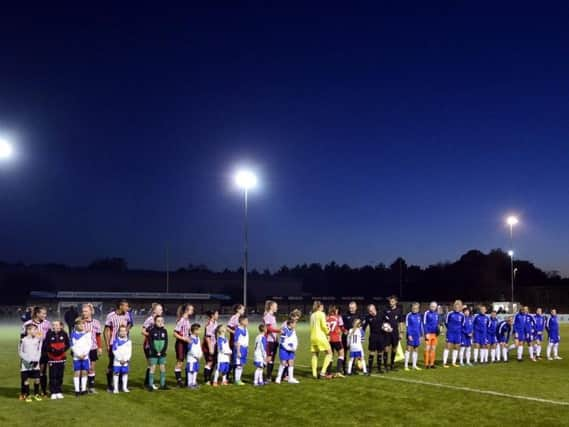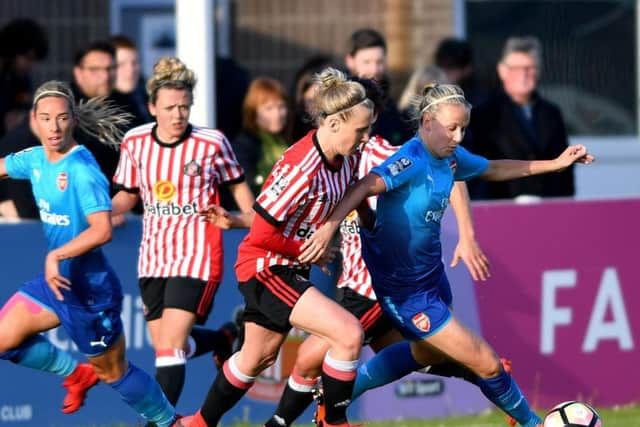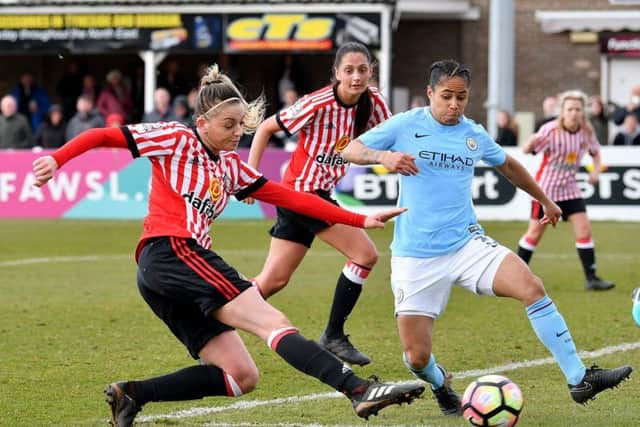Sunderland Ladies' demotion: How it happened, what it means and what next


The Lady Black Cats, who have enjoyed an illustrious history since they first formed in 1999, are now set to play in the FA Women’s National League - despite a seventh place finish in the top flight last year.


Here’s everything you need to know about the Ladies’ current situation - including how it happened, what it means and, crucially, how their future could unfold.
How did Sunderland get demoted two tiers?
Advertisement
Hide AdAdvertisement
Hide AdSunderland were demoted two tiers after their application for a place in the top two leagues of women’s football was snubbed.
It is believed that the Lady Black Cats applied for a place in the second division - the FA Women’s Championship - but were unsuccessful.


This meant they had to slot in at the next available level, which happened to be the FA Womens’ National League (tier three).
Why did Sunderland have to apply for a place in the league?
Advertisement
Hide AdAdvertisement
Hide AdIn September of last year, the FA announced plans for a full restructure of women’s football - including a new, fully-professional top flight and a semi-professional second tier.
All teams currently in the top two tiers (the FA WSL and FA WSL 2) - including Sunderland, who played in the top tier (FA WSL 1) - were asked to reapply for a place.
The application took into account all aspects of the club’s operation - from coaching standards and facilities to marketing and commercial plans.
Current FA WSL clubs had until November to submit an application, with decisions then delivered in December.
Did Sunderland apply at this point?
Advertisement
Hide AdAdvertisement
Hide AdSunderland elected not to apply in November - and they weren’t alone.
Watford and Oxford, both of whom played in the tier below Sunderland (FA WSL 2), also decided to delay their application.
The Lady Black Cats said they were working on a collaborative approach ahead of submitting an application at a later date.
So when did Sunderland apply?
Advertisement
Hide AdAdvertisement
Hide AdSunderland submitted their application in March. At this point, the application process had opened up to clubs that were currently outside the top two tiers of women’s football.
This meant that Sunderland were up against some tough competition, including the likes of West Ham United and Manchester United whose applications were successful.
As previously stated, it is understood that Sunderland applied for a place in the FA Women’s Championship, which is the new-look, semi-professional second tier.
Why was the application rejected?
Advertisement
Hide AdAdvertisement
Hide AdSunderland were told their application was unsuccessful at the end of May, when the rest of the clubs who applied were also informed of their fates.
Without heavily speculating, it’s tough to know why Sunderland’s application was unsuccessful.
At the time of making the decision, Baroness Sue Campbell, The FA’s Head of Women’s Football said: “Such is the strength of women’s football in this country, there have been some difficult decisions to make but they’ve been made with the sport’s best interests at heart.”
Advertisement
Hide AdAdvertisement
Hide AdIt’s therefore likely that bids submitted were viewed as ‘stronger’ than Sunderland’s and more in-keeping with the FA’s vision, hence why they were accepted ahead of the Black Cats.
What about the appeal process, how did that work?
With the backing of new owner Stewart Donald, Sunderland submitted an appeal against the FA’s decision.
It’s important to remember that Donald was not involved in the initial bid, and he was keen to bring the Ladies’ team back in house.
Prior to Donald arriving, the side left the Academy of Light to train in Newcastle, while they also moved from their long-standing home ground at Hetton to South Shields - a move which saw gate revenues and attendances drop.
Advertisement
Hide AdAdvertisement
Hide AdBut as reported by the Echo, Donald insisted that the club remained an important part of his plans as an appeal was launched.
He said: “The ladies team is an important part of our Sunderland family.
“When you look at their history, seven of the current England women’s squad was produced by Sunderland, which is something to be very proud of.
“We want to continue the club’s long-standing tradition of developing top-class women’s footballers, as well as giving young girls the opportunity to aspire to play for Sunderland when they grow up.”
Advertisement
Hide AdAdvertisement
Hide AdSunderland, along with Blackburn Rovers, Crystal Palace and another unnamed club, launched an appeal against their omission.
While Crystal Palace’s appeal was successful, and they were offered a place in the FA Women’s Championship, Sunderland and Blackburn’s were both dismissed.
The other,unnamed club - which is heavily rumoured to be Southampton - are still midway through the appeals process.
What does that mean for the future of the Ladies’ team?
Advertisement
Hide AdAdvertisement
Hide AdIn the short-term, it means that the Lady Black Cats will be playing in the FA Women’s National League Northern Premier Division for the 2018/19 season.
For those unfamiliar with women’s football, that is the new name for the third tier which falls beneath the FA Women’s Super League (tier one) and FA Women’s Championship (tier two).
How does that affect the club?
Sunderland will now play in a more regionalised league - gone will be the long trips to Yeovil and Bristol and in will come shorter excursions to Middlesbrough and Doncaster, among others.
The Lady Black Cats’ full list of league opponents for the 2018/19 season is: Bradford City, Blackburn Rovers, Guiseley Vixens, Derby County, Doncaster Belles, Fylde, Huddersfield Town, Hull City, Middlesbrough, Nottingham Forest, Sheffield FC and Stoke City.
Advertisement
Hide AdAdvertisement
Hide AdIn terms of staffing, there are a number of minimum requirements in the FA Women’s Super League which require certain amounts of money to be spent on admin, coaching, performance and marketing staff.
There will be no such requirements in the National League, which could allow Sunderland to operate a more streamlined model.
Players may depart - and several already have - but Sunderland should still be able to attract talented individuals at that level.
Advertisement
Hide AdAdvertisement
Hide AdAs well as playing in the National League, Sunderland will also play in new cup competitions.
They will no longer compete in the Continental Cup and will instead compete for the FA WPL League Cup.
Sunderland will still take part in the FA Women’s Cup, but will enter at an earlier stage than they have done previously.
Can Sunderland win promotion back to the top tier?
Technically, yes.
There will be promotion from the National League to the FA Women’s Championship this season - but it can get a bit complicated.
Advertisement
Hide AdAdvertisement
Hide AdShould Sunderland win their league, they will face the winners of the Southern Division in a winner-takes-all play-off for a place in the Championship.
If the Lady Black Cats are triumphant in the play-off then they will take a place in tier two, providing that they meet the relevant criteria laid out by the FA in regards to coaching, training hours and off-field infrastructure.
Similarly, if Sunderland were then to go on to win the Championship then they could reach the top flight again - but only if they meet the higher criteria.